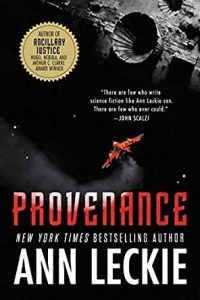Amazon Affiliate Link | Bookshop.org Affiliate Link
Ann Leckie is probably my favorite author. She writes excellent science fiction and fantasy, and her books are jam packed with incredible world building, a mixture of politics and action, and a heavy dose of gender fuckery. I cannot be normal about her books, and almost always go off the rails on a tangent. I’ll try my best to stay on track here.
Provenance is in the same universe as the Imperial Radch trilogy, but it’s set on Hwae, a tiny system of just one planet and a handful of stations far outside of the Radch. It follows Ingray, an adopted daughter of a politician, who wants to prove herself as being more worthy than her brother to inherit their mother’s title. To do this, she breaks Pahlad Boudrakim, famous thief, out of prison, in the hopes that his stolen goods will give her mother enough power to defeat her political rival. But the person she springs from prison claims e isn’t Pahlad but instead adopts the name Garal Ket, the alien Geck claim that the ship they bought transport home on is stolen, and back home there are visitors from an expansionist system trying to prove their historic connections to Hwae in order to legitimize a potential invasion. Ingray finds herself at the center of a knot of politics, and that’s before the murder happens.
The complicated politics which drive most of the plot of Provenance make it hard to talk about, because there are so many threads involved. But at its heart, Provenance is about how people form personal and political identities. Ingray is trying to solidify her connection to her mother, whom, as a child from a public creche, is the only family connection she has. Pahlad Boudrakim was sent to prison and declared legally dead for stealing vestiges that connected eir father’s family to a famous genocide, and replacing them with forgeries. Hwae itself relies on vestiges of its political independence to justify governmental legitimacy—vestiges which Garal claims are all forged. The central question of all the various political schemes is this: what makes someone who they are? What defines a Hwaean, or even a human? What if those definitions were proven to be fakes? Each character grapples with this in their own way.
But it wouldn’t be an Ann Leckie book without gender, so let’s take a detour into that! Hwae doesn’t have a gender binary, but rather a gender trinary, and children are all considered gender neutral until they choose a gender (man, woman, or niemann) and become an adult. But there are even exceptions to this trinary, proving that three genders are not inherently better than two. Ingray has a childhood friend, Taucris, who only recently chose her adult gender—several years after most people, and even then only because she wanted to progress in her career rather than be a permanent intern. Still, she doesn’t seem particularly connected to her chosen gender, and is more interested in Ingray than womanhood itself.
While Provenance is more of a political novel than anything else—there aren’t any epic space battles here—it is still more interesting than I’ve made it sound, I promise. Ingray is constantly uncovering new truths about her world and constantly pivoting to try and stay on top of each new situation. Whether she’s running out in the middle of the night to stop her brother from doing something foolish, helping a friend impersonate an alien ambassador, or hitting someone with a shoe, the book keeps you guessing with each new development.
Overall, Provenance is a fun addition to the series, although it hasn’t become part of my soul in the same way the original trilogy has. I loved seeing the Radchaai ambassador from an outside perspective, as a fussy, incompetent embarrassment with a cartoon villain accent. There were some minor spoilers for the trilogy (and a whole lot of world building skimmed over—for how much discussion of Garseddai vestiges this book had there was none about Garsedd), so I would recommend reading them first, but I also proselytize Ancillary Justice at every opportunity, so I’m slightly biased there. But a slightly less exciting Ann Leckie book is still an Ann Leckie book, and still some of my favorite science fiction. I promise there’s action and excitement in this book, but the themes! The world building! The aliens! Please go read it. And then let me rant about it at you.

